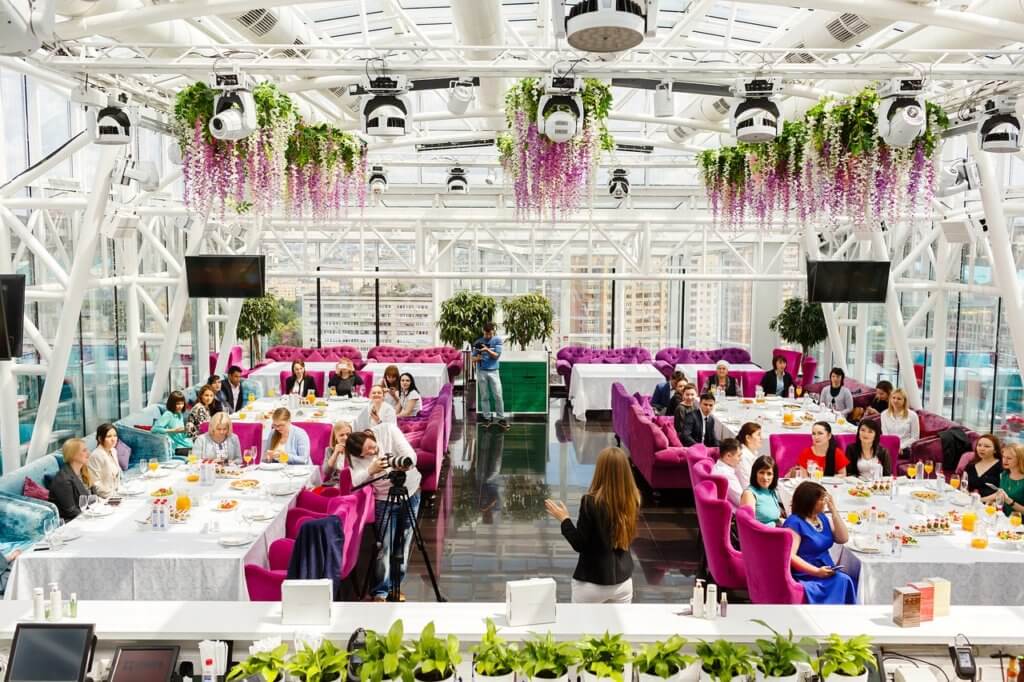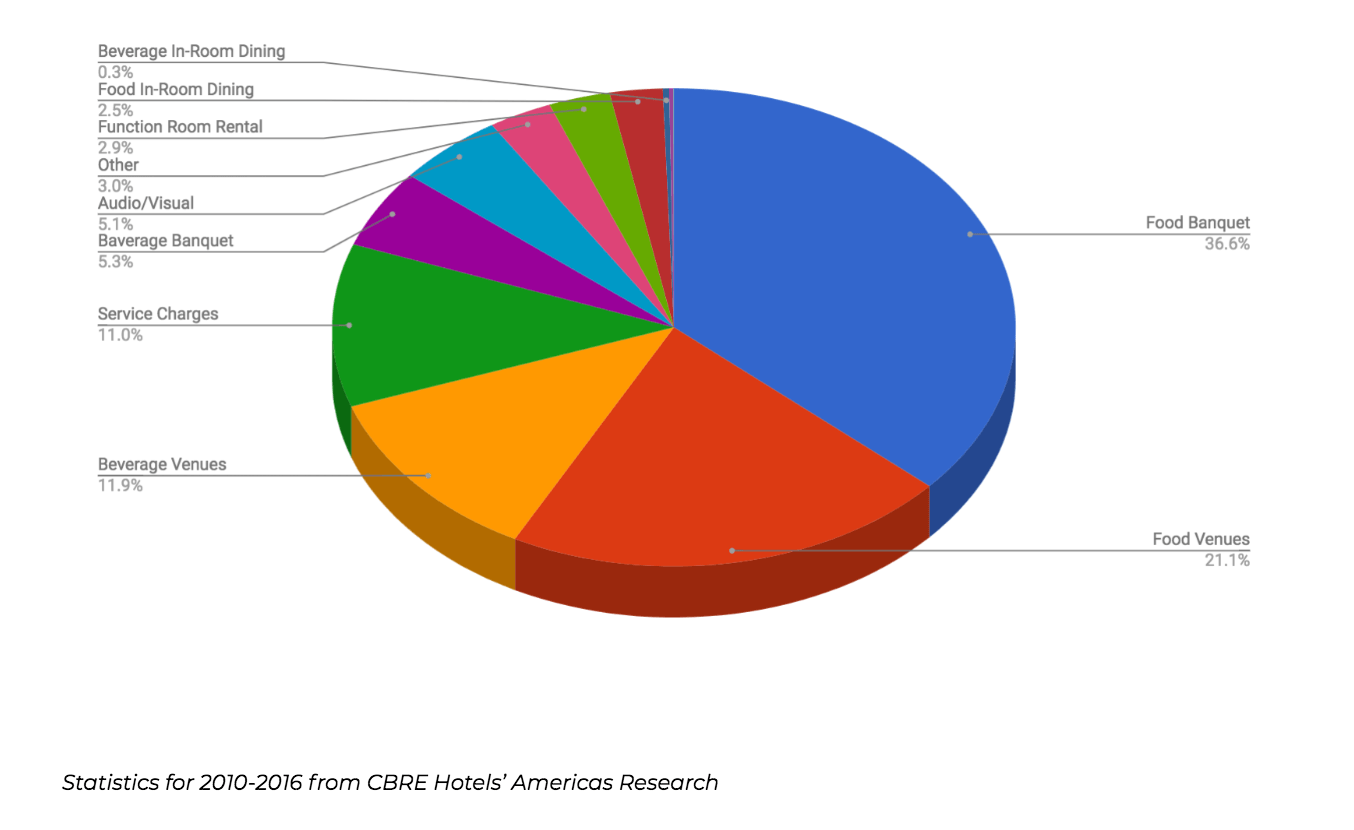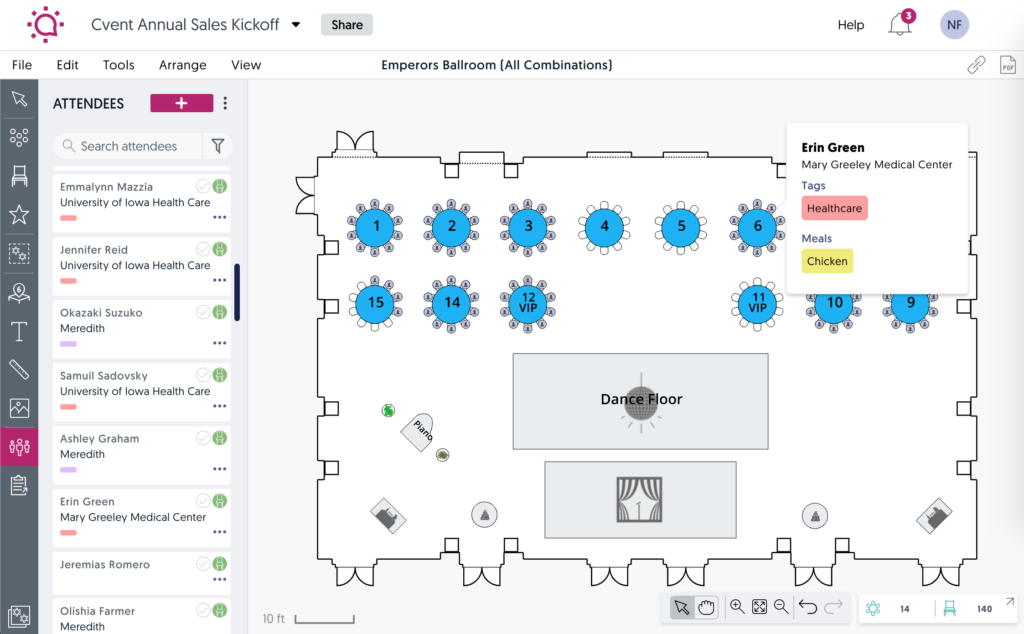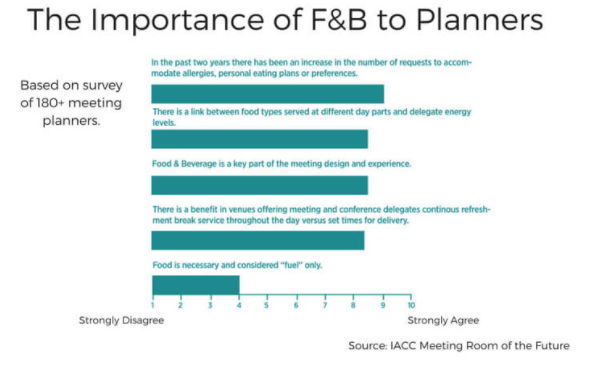
6 Innovative Hotel Food & Beverage Ideas That Grow Group Revenue
Hotel food & beverage is no longer just an add-on amenity. Because of favorable margins and exciting new strategies, there's a big opportunity to grow group revenue with hotel F&B.
And here's why. At the end of the day, hotels really only have two ways to boost group revenue:
- Increase group sales by booking more events.
- Increase the revenue brought in from each booking.
The first option is great if your property can handle the volume. But for hotels that already struggle to provide the supply for demand, the second option is the better bet.
Luckily, relying on food and beverage to grow your revenue doesn't have to be an uphill battle. Let us prove it to you.
Here's proof that hotel food & beverage can really grow revenue
Group events are bringing in more F&B sales.
For properties that keep operations in-house, hotel food & beverage typically represents 25% of total revenue ” and that portion grows year over year. More importantly, group events make up half of that business. At upscale and luxury hotels, group events make up an even larger portion of F&B business.
In fact, in 2017 catering and banquet sales accounted for:
- 57% of F&B revenue at luxury hotels
- 59% of F&B revenue at upper-upscale properties
- 58% of F&B revenue at upscale hotels
That number is expected to climb, as 61% of hotel GMs and F&B Directors plan net growth in catering by the end of the year.
Why? In large part, it's the margins. Between 2010 and 2016, CBRE reports that F&B profit margin increased from 24.9% to 29.5%.
[Tweet "Due to favorable margins and exciting new strategies, there's a big opportunity to grow group revenue with hotel F&B."]

F&B is the third most important factor in site selection.
Location and price are the two biggest determining factors in site selection. But after that, a hotel's food and beverage offerings are the next decision maker, according to a recent IACC survey.
For planners deciding between multiple viable event spaces, F&B becomes the key difference maker. That's why hotels are, as Technomic's Senior Principal David Henkes puts it, "[Using] their food-and-beverage programs as competitive differentiators and are investing to drive unique guest experiences.
6 ideas to grow hotel food & beverage revenue
By now, hopefully we have demonstrated that food & beverage offers a huge opportunity to boost your bottom line. But how do you bring in more hotel food and beverage sales? We have a few ideas for you.
1. Transform hotel spaces into F&B spaces.
Because experiences so important in today's events, planners are looking for non-traditional event spaces. In fact, the AMEX Global Meetings Forecast predicted a nearly 4% increase in demand for nontraditional spaces. So how can hotels compete?
Try to create a nontraditional space on your property. For example, design a space focused on social and community interaction. This takes advantage of attendees' desire to network. Ultimately, this will drive revenue from cocktail hours and post-event spend by attendees.
Another example is a unique rooftop. In June 2017, for instance, Chicago hotels with rooftop access saw a $13 increase in revenue-per-seat compared to those without.
If possible, you could monetize the are around the property ” think walking trails, waterfronts, city parks, and beyond.
2. Use technology to grow F&B efficiency.
The right food & beverage technology can make your food & beverage operation much more efficient. In fact, the right event management platform can:
- Handle special meal requirements
- Visually communicate upsells in proposals
- Eliminate friction between planners and properties
- Create 3D diagrams of the F&B space
- Much, much more
The ROI of these tools is real. A recent study by STR found properties that use our event services technology averaged nearly 2% more food and beverage profit.

3. Ditch set meal times. Instead, serve refreshments continuously.
A majority of planners strongly agree that there's a benefit to providing continuous F&B. And planners and attendees often prefer beverage and snack stations because:
- Guests aren’t confined to their seats
- The ability to choose creates an added layer of personalization
- It brings some freedom and flexibity to often-rigid events
While stations must be constantly monitored and replenished by staff, they offer hotels a unique upsell opportunity that should be included in proposals.
4. Cater to the locavore.
Today, attendees are looking for authentic local experiences. One way planners deliver on this is with food & beverage.
It's a massive food trend that hotels really take advantage of. Recent F&B research from Technomic shows that hotels are doing just that.
By showcasing local food and beverage, hotels can compete with local restaurants that might otherwise be more attractive to attendees and planners.
A locally inspired dining experience starts with the menu. Does it feature local bites and brews? It should include:
- Locally-sourced produce
- Menu items native to the area
- Craft brews
- Wine from nearly wineries
- Cocktails made with liquor from local distilleries
These options offer a deeper, more authentic connection to the area. As a bonus, you might save on shipping costs and elevate your hotel's brand.
5. Accommodate dietary restrictions.
Planners agree that over the past few years, more attendees are requesting accommodations for specific allergies or dietary restrictions. In the same IACC mentioned earlier, planners rated these statements as most true:

Accommodating guests' dietary needs is a great opportunity for upselling. No attendee wants to forgo a meal because of an allergy or a food sensitivity, and rarely do they want to make a fuss about their dietary restrictions.
Foods that cater to everyone should be readily available, easily identifiable, and separated from other foods. Venues that can serve vegan, vegetarian, gluten-free, and dairy-free options will be more attractive to planners ” even if they are more expensive.
Just having these items available is all that it takes to lock in a higher price.
6. Make F&B an experience in itself.
When you take a creative approach to your hotel's ood & beverage service, you can win planners over with innovative ideas. Because planners want to create experiences, they might love the idea of craft beer tastings, cocktail mixing classes, or DIY taco stations. Best of all, these interactive food and beverage ideas can generate big revenue.
For example, at Marriott's innovation incubator hotel, the meeting space includes the LG Studio. The studio is a full kitchen, which creates the opportunity for all kinds of culinary experiences in the event space.
Consider it food for thought.
While not every property or venue can take advantage of all of the above ideas, we hope one or two will work for you.
What's your group sales strategy for the year ahead? Download our group business ebook for 30 pages of compelling stats, case studies, and actionable insights on group F&B strategy and more.
More food & beverage questions?
What is F&B revenue?
F&B revenue refers to all revenue generated from the food and beverage sales in a hotel.
How can food & beverage revenue be increased?
- Transform hotel spaces into F&B spaces
- Use technology to grow F&B efficiency
- Serve refreshments continuously
- Cater to the locavore
- Accommodate dietary restrictions
- Make F&B an experience in itself

